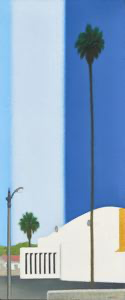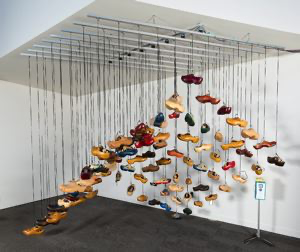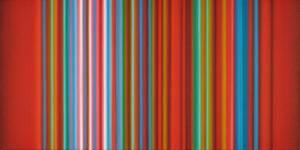| Showing 1 of 1 |
|
Edward Biberman
American
(1904–1986)
Palladium II
circa 1950
Acrylic on board
50 x 22 x 1.25 in.
Gift of the Marie Eccles Caine Foundation
1997.9
During the Depression era, Edward Biberman used the urban landscape of Los Angeles as a backdrop for paintings reflecting the social and economic difficulties of the period. After World War II, however, he seldom engaged in social commentary, turning instead to the abstract qualities of architecture. The cool minimalism of Los Angeles became a hallmark of his work as he sought, in his own words, “the striking beauty of freeway curves ...the evocative forms that engineering necessity often gave to many industrial and civic structures.”
In works of formal reduction and precision like “Palladium II” one finds the quiet radiance of Southern California’s light and space. This painting depicts a Streamline Moderne building, two palm trees, a small adobe-style home, an elegant lamppost, and a green rolling hill presented in a radical perpendicular format. Biberman has depicted a scene of quintessentially Southern California motifs, including the glare and haze that hover over the region’s landscape. A surreal sky dominates the scene, composed of three soft-focus, vertical strips of varying blue. The abstracted architectural structure is a reference to the famous Hollywood Palladium ballroom that opened in 1940 at Sunset and Gower, an area laden with history as the home to many prominent film studios during the golden age of cinema.
Biberman made this painting around 1950, soon after Senator Joseph R. McCarthy began making reckless public accusations of Communist subversion, silencing a whole generation of artists and intellectuals. Biberman’s brother, Herbert, a prominent screenwriter and director, was one of the Hollywood Ten, jailed after refusing to cooperate with McCarthy’s committee. Edward Biberman, also eventually accused of Communist sympathies, never recovered professionally from the blow. One wonders how much the experience contributed to his change of subject matter from social unrest to reductive architecture and the California skyline. Implicit in the towering sky here, perhaps, is the message that there’s more to the story than meets the eye.
Susan M. Anderson
Click a term to view the records with the same keyword
- blue
- buildings - Structures, generally enclosed, that are used or intended to be used for sheltering an activity or occupancy.
- palms
- sky
- white
- Uses of the Real I , 1/20/2008 - 4/30/2011
- Collecting on the Edge Part I , 9/15/2018 - 12/15/2018
- Collecting on the Edge , 9/15/2018 - 5/4/2019
- Collecting on the Edge Part II Nora Eccles Harrison Museum of Art , 1/17/2019 - 5/4/2019
This object is a member of the following portfolios:
Your current search criteria is: Related to "Edward Biberman".



